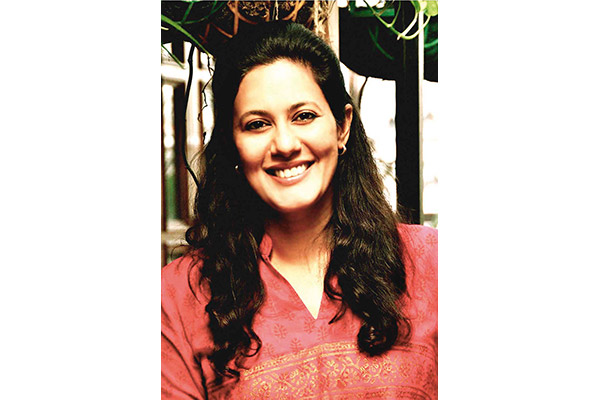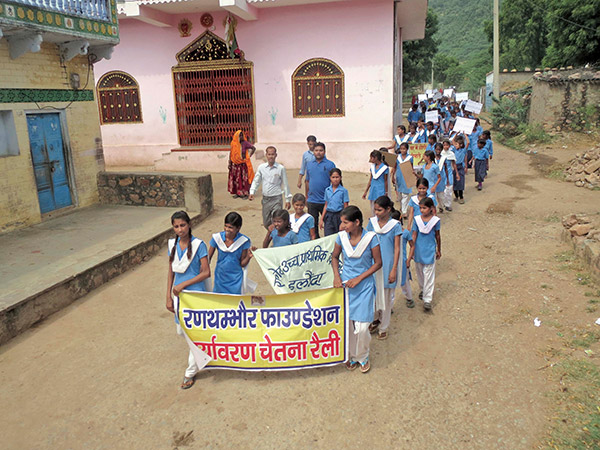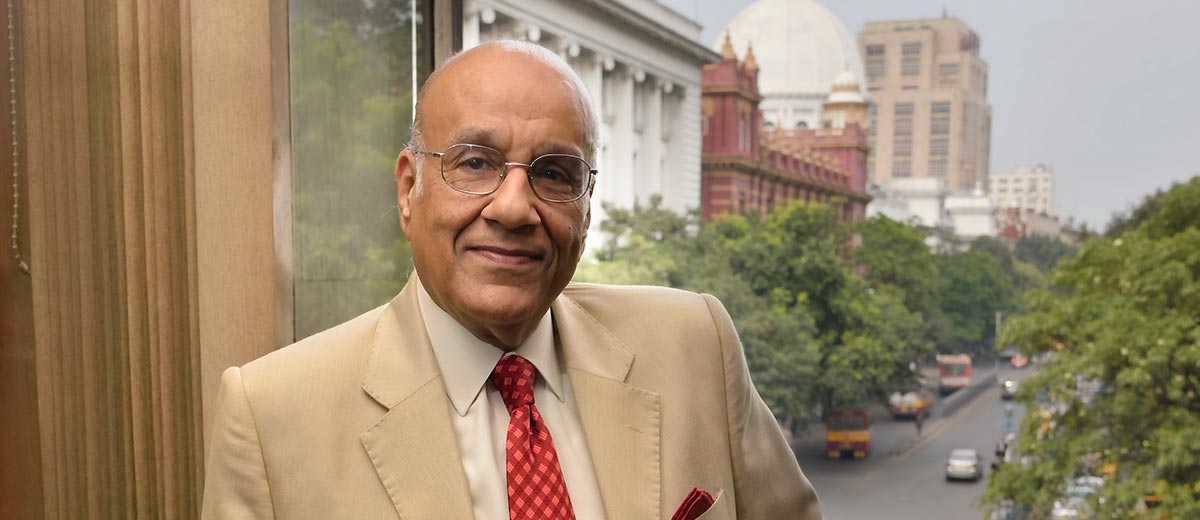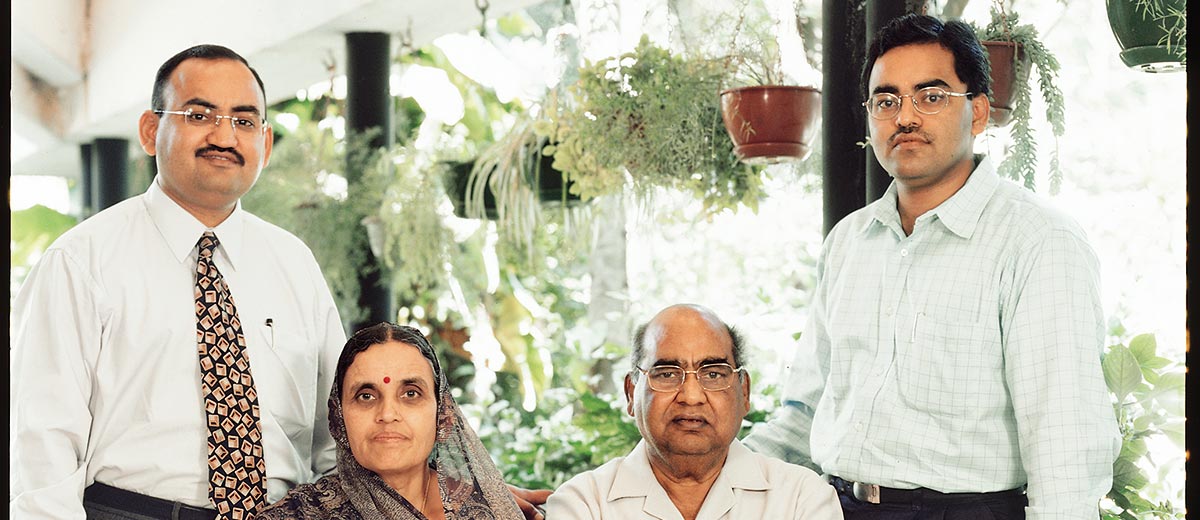
Determined to Win
Determined to Win
Back in 1938, it was a long way from Dhulian to Kolkata, and so was it for any aspiring Marwari to be a man of letters given the apathy towards education among Marwaris in those days. Having embarked upon both these journeys at the tender age of 12, Kashi Nath Memani exhibited rare mettle that was to put him in the driver’s seat of Ernst & Young in India one day and script its huge success story, while, of course, exemplifying the perfect art of balancing a stellar career with equal passion for arts, literature and service to humanity.
Text: Joseph Rozario
DHULIAN, A NONDESCRIPT town along the banks of the Ganges in the Murshidabad district of West Bengal, hardly comes across as a business hub, but back in the early twentieth century, it was a promising trading centre. Given its vantage point, Dhulian facilitated both riverine and land trades and so despite its remoteness, the ever adventuresome Marwari trader was not to be deterred. Some of them pitched camp in the town, and among them were the Memanis, who had come all the way from Nohar, in Bikaner, Rajasthan. To this household Kashi Nath Memani was born in August 1938, to Bhagwan Das Memani and Janki Devi.
A diamond in the rough
The Memanis were a well-to-do family, who traded in raw jute, grains, jaggery, linseed, mustard and black lentils. Back in 1938, education was counted among the least of priorities for Marwaris, and picking the nuances of the family business under the tutelage of an elder was considered the rite of passage for any young man. Kashi Nath Memani, it was expected, would join the family business once he came of age, but he was cast in a different mould. Unlike his siblings, he exhibited unusual aptitude and appetite for learning. In fact, with such acuteness he felt the need to imbibe knowledge that he was willing to go the extra mile for it, even if that meant forgoing the comforts of home and roughing it in faraway Calcutta (now Kolkata).
Given his tender age and the Marwari community’s disinclination towards education in those days, this, however, was an unacceptable proposition for family elders. But Kashi Nath was persistent. “I made an adamant appeal to tauji, who was the family patriarch, that I be allowed to pursue formal schooling in Calcutta,” says Memani. “It was a tough decision to allow a 12-year-old to stay away from his parents in a faraway place like Calcutta, but looking at my unusual zeal, the family relented.”
Kashi Nath Memani left home for Calcutta in 1950. It wasn’t the best of times for the Memanis, who had just emerged from the anxiety of Partition and the communal disharmony of the pre-Independence years. Further, the fast eroding Ganges (or Padma, as it is locally called) and the uncertainty of which side of the border Dhulian would fall after Partition had caused the family to move house several times. All these factors caused the family business to be destabilised, leading to a loss of both wealth and status.
Life in the city
With no proper accommodation, things weren’t better for Kashi Nath in the city either. “In Calcutta, I was under the guardianship of a 24-year-old cousin brother who himself was struggling to find his feet in setting up a small trading business. He had a small office—or gaddi, as it was called—in the lower floor of the building where he resided. The cousin, and sometimes others too, would occupy it to run their businesses. After trading hours, this gaddi used to be my abode. With these humble beginnings, I began my journey in Calcutta,” says Memani.
Despite these constraints, thanks to his gift of intellect, he sailed through both high school (in 1956) and Intermediate (in 1958) comfortably, having actually stood first in the Intermediate exams. For graduation, he proceeded to City College, where he chose to pursue a degree in commerce (BCom). Being a Marwari and coming from a business background, accounts and commerce seemed easy enough, but given the financial implications of pursuing higher education, the need to take up a job now became imperative. With that, the hunt for a suitable job began.
If there is one quality beyond academic brilliance, hard work and diligence that has worked in Kashi Nath’s favour throughout his life, it is his gregariousness. Outgoing, affable, humble and genuinely helpful, he made numerous friends throughout life, most of who remained true to him. Back in his Intermediate days, he had forged lifelong friendships with several college mates, and one among them was Manik Bachhawat. Manik Bachhawat had an elder brother Suresh, and it was through him that Kashi Nath gained an introduction to the well-known accounting firm S R Batliboi & Co and subsequently landed a job in the firm. “I made a very good impression with a few compassionate people I met at S R Batliboi & Co. They saw drive and enthusiasm in me as also the sheer will to succeed, and realising that I came from a needy background, they offered me a job,” says Memani. Little did he know then that it was to change his life and future and take him to the pinnacle of success one day.
Taking account of things
As if made for a career in accounting, Kashi Nath Memani showed promise right from the outset and was an instant hit with his bosses. Encouraged, his next objective was to pursue the chartered accountancy (CA) course, the successful completion of which would ensure him a prestigious and rewarding career. But the course came with a list of pre-requisites such as exams, orientation programme, training and, of course, the all-important articleship (a three-year practical training phase that allows students to work on real assignments for chartered accountancy firms). Fulfilling these pre-requisites and being granted articleship by the company entailed a lot of hard work and extensive travelling to various client locations, but Kashi Nath was up for it. Finally, after three grueling years, he was granted the coveted articleship in the firm. “It was a dream come true for me,” says Memani. “Having gained the admiration of many seniors as a very effective auditor, the bosses in the firm offered me apprenticeship for the CA course, which I grabbed with both arms. And I have never looked back since.”
Three years later, Memani cleared the ICAI (Institute of Chartered Accountants of India) exam in his very first attempt and became a qualified chartered accountant in 1965.
In the meanwhile, he had got married to Kiran, née Chandralekha Bagri, who proved to be a worthy companion in every sense. In 1968, their son Rajiv was born. By then Kashi Nath Memani’s career had taken a quantum leap and he was now a ‘partner’ (a highly ranked position which entails managing clients and staff members) in one of Calcutta’s most prominent CA firms. This was a huge achievement. And he was just 29! Ten years later, his daughter Rituu was to be born.
On the social front, things had fared equally well for him. Having acquired considerable name and fame in corporate circles because of his profession, he was appointed the president of the prestigious Lions Club of Calcutta in 1970.
Starting a new chapter
Until now, Calcutta had been the chief commercial hub in the country. This, however, was to change with the Naxalite movement adversely affecting the state’s business machinery in the seventies, forcing many companies to look to other cities for growth. Bombay (now Mumbai) and Delhi were hot favourites. While Bombay was clearly stealing a march and emerging as the new business capital of India, Delhi was gaining prominence too. Further, Delhi being the centre of politics and administration, the city offered certain perks, it being the days of the Licence Raj. S R Batliboi & Co was keen to exploit these opportunities, and Kashi Nath Memani, on his part, was keen to take up the challenge of setting up a new base in the national capital. With this, he moved over to Delhi. “I was determined to succeed,” says Memani.
The going proved to be good for Memani in Delhi. After the initial period of setting up an office and building a team, the firm was able to make rapid progress and create a very good impact. As the years wore on, tired of the old restrictive Licence Raj, the business community was eager for the new liberalisation wave that had started making gradual inroads into the economy. It marked the beginning of a new era of freeing markets, dismantling controls and encouraging foreign investment. Consequently, manufacturing activity saw a boost, MNCs started pouring in and the changing business environment brought new opportunities for growth for both national and international accounting firms. Among international accounting firms which had representative firms in India at the time were Arthur Young, a New York-based firm, and Ernst & Whinney, a firm based in Cleveland. While Arthur Young was represented by S R Batliboi & Co in India, S B Bilimoria & Co, a Bombay-based accounting firm represented Ernst & Whinney.
Up the rungs of success
Kashi Nath Memani in those days would travel widely to woo MNCs to set up business in India, in view of the growth opportunities that India’s now liberalised market provided. “We would custom-design entry strategies for MNCs to facilitate the process and liaise with government bodies to obtain the necessary permits and licenses for them. All this resulted in India attracting millions of dollars of investment from foreign companies,” says Memani. Under his leadership, the Delhi branch grew phenomenally to become the largest branch in India. “Building the right teams, empowering youngsters, creating a good work atmosphere and entrepreneurial spirit in enhancing the business were the key factors behind the phenomenal growth,” adds Memani, reflecting on those hectic times.
In his next move, by replicating the Delhi model, he enabled the firm to expand its reach to other cities such as Bangalore (now Bengaluru), Pune, Chennai and Hyderabad. As fate would have it, at this juncture, two major developments were to dramatically impact both the firm and Memani, resulting in a huge spurt of growth for both. The first was a merger of the two global accounting firms Ernst & Whinney and Arthur Young in 1989 to form Ernst & Young (EY), which resulted in the formation of the world’s biggest accounting firm. The second was EY Global choosing S R Batliboi & Co (and not S B Bilimoria & Co) to be their sole member firm in India, a few years on in 1996. With this, Kashi Nath Memani was appointed ‘Chairman & Country Managing Partner’ of S R Batliboi & Co and Ernst & Young India, a post he held till his retirement in 2004.
Memani’s last major achievement was the institution of the hugely successful ‘EY Entrepreneur of the Year Award’ in 1999, which built a lot of goodwill for the EY brand in India. The award was based on the premise that since entrepreneurs build businesses and the nation, they need to be recognised and applauded for their efforts. Just prior to his retirement, the collapse of the global accounting giant Arthur Anderson in the wake of the Enron fiasco of 2002 (Enron was a client of Arthur Anderson) provided yet another huge opportunity for growth for the firm when it scooped up a large number of Arthur Anderson’s clients, partners and employees to become the country’s largest firm in terms of both revenue and competencies. Having maintained a steady growth trajectory since then, today, EY India offers a bouquet of services including tax, advisory, transactions and assurance services, which it delivers through its 32 offices in 17 cities.
Taking a full audit of life
Retirement, however, has not been able to rein in Memani, who has continued to help numerous organisations with his professional knowledge, as a board member. Among them include big names like DLF, Hindustan Times, ICICI Ventures, Yes Bank, Chambal Fertilisers, Spice Telecom, Great Eastern Energy Corp and Emami Limited, to name a few. That apart, his lifelong passion for poetry and association with poets continue, as he continues to promote upcoming talent and propagate the literary and cultural traditions of India.
Yet another area which has kept him occupied is philanthropy. Be it in terms of financial support to charitable organisations, or sponsoring the education of the underprivileged, or extending his support for the well-being of the girl child, his involvement and contribution to philanthropy has always been immense. Among the institutions he is closely associated with today are Ekal Vidhyalaya Foundation of India, Pardada Pardadi Education Society, Rotary Blood Bank, and others.
Now almost an octogenarian, at home, after a lifetime of togetherness, wife Kiran continues to be “a pillar of strength and a life partner par excellence” for Memani. His fondness for her having grown manifold in his twilight years, in retrospect he credits her in equal measure for his hugely successful life. He is also close to his two children, Rajiv and Rituu. While Rajiv is married now and is an accomplished chartered accountant, Rituu pursues her own business in the digital space.
Looking back at Memani’s four-and-a-half decade association with S R Batliboi & Co/EY India, his formative years, his roller-coaster career and his unusual ability to win, the story of his life reads like an inspiring tale of zeal, hard work and diligence. Gifted with the ability to spot opportunities and the sagacity to make the most of them, his is a story of a man’s sheer determination to win despite the odds—with, of course, his Marwari business genes doing their bit and lady luck chipping in once in a while.










